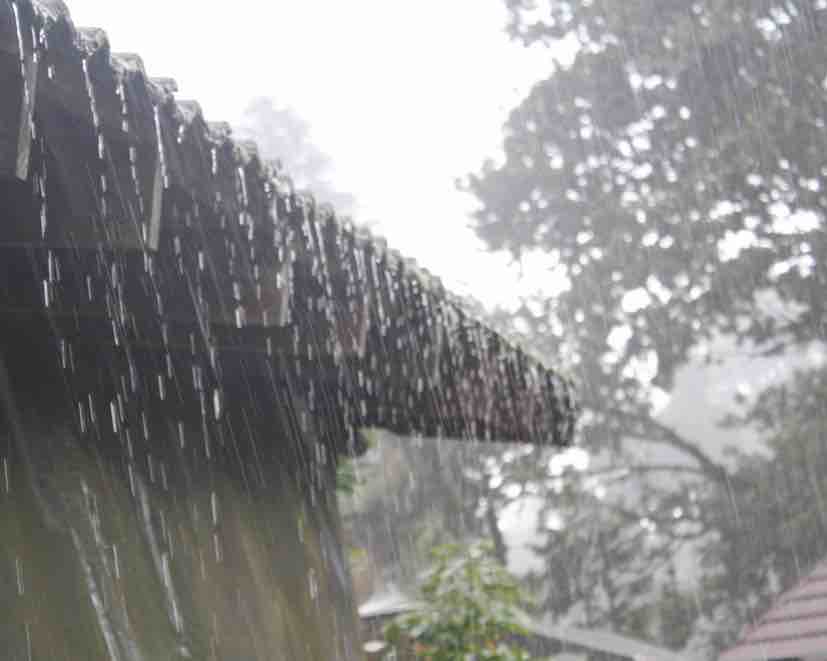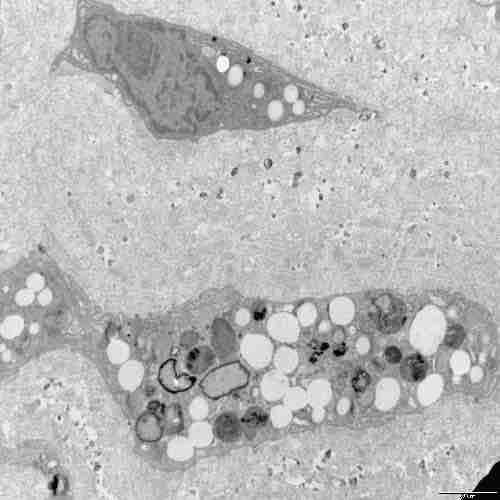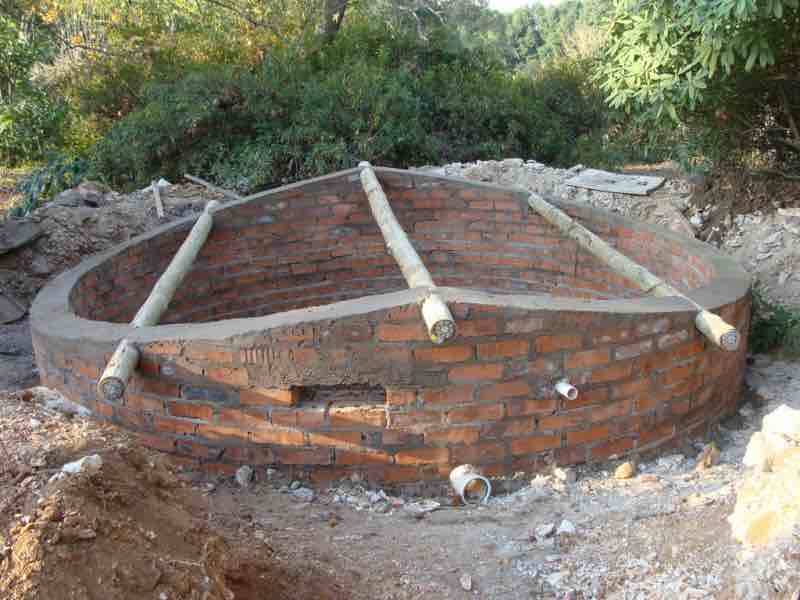- Homepage
- Our green rainwater
- Avoid Plastic in Water By Harvesting the Rain
Avoid plastic in water by harvesting the rain
We aim to avoid plastic in water by harvesting the rain falling on our roof and then storing it underground in a reservoir where it remains very cold; bacteria are less likely to proliferate.
Consuming as little synthetic chemicals overall as possible from our food too is important; humans are eating a vast amount of plastic microparticles that are today found in abundance in the filtering organs of our bodies and in the blood supply. Then it is deposited in the intima of our arteries; and in the brain.
These microplastic particles have become ubiquitous; they are to be found throughout the food chain, in the water we drink and in the air we breathe. They are everywhere and extremely difficult to avoid.
Whilst there may be very small amounts of plastic microparticles in the rain, as compared to commercial piped and bottled water, it is minuscule.

The only way to completely remove all plastic microparticles from our drinking water is to use reverse osmosis; and that has drawbacks too. The beneficial minerals are also extracted.
We normally get about 10% of our minerals from the water we drink.
Surprisingly there are some minerals in rainwater; but not a lot.
Most of this plastic is completely non-biodegradable; so it continues to build up in our landfills from where it leaches out into dams and rivers. Currently every year another 400 million tons are being added to our waste.
Worldwide we buy water in 1,5 trillion plastic bottles every day; some of them are recycled of course.
Nanoplastics
Microplastics are particles less than 5mm in diameter; exposed to sunshine, wind and sea they decompose to bits smaller than can be seen by the human eye.
Less than one micron in size they are called nanoplastics. They are found today in every conceivable nook of the planet; in the water we drink and the food we eat.
Over 90% of bottled water contains these nano-plastic particles. Microbeads are also used extensively in cosmetics and toothpaste adding to the pollution of our rivers and oceans, finding their way eventually to our taps.
We can avoid plastic in water by harvesting the rain; and even then we may get some.
Seasalt
By far the greater amount of salt that we humans consume comes from the sea; and so of course its loaded with nanoparticles of plastic.
Saltwater fish
Although they have been banned, Polychorinated Biphenyls (PCBs) are known for being "persistent organic pollutants." They were used widely in flame retardants and coolants; and will remain for ever in the environment.
In particular they dissolve readily in animal fats; we are exposed to them unknowingly in our food.
"Research has shown that farmed salmon is likely to be the most PCB-contaminated protein source in the US diet."
Plastic waste is accumulating in the oceans at the most alarming rate; by 2050, just 30-odd years away there will by weight be more in the sea than fish.
Already plastic microparticles have been found widely in seafood and it's rapidly getting worse.
We find ourselves trapped between the proverbial devil and the deeply polluted blue sea; we are encouraged to eat more food from the oceans, particularly for the omega-3 content but told to avoid it because of plastic and PCB contamination. Luckily current research shows that from plants it is far more effective than first thought.
Damned if we do, and stuffed if we don't.
Tea bags
Tea lovers the world over would be devastated if they read the research from McGill university that each sachet releases literally billions of nano-sized particles of plastic into every cuppa[3].
Fortunately loose tea tastes fare better but in a world ever looking for shortcuts those little sachets appeared to be one good way to make our lives easier. Whether it's the plastic in water or the little bag itself it seems we are doomed to yet more toxic chemicals from our food and drink; unless we take drastic action.
These plastic particles have been shown to be present in the blood of even "healthy" individuals. It comes as no surprise that the rates of allergic, inflammatory and autoimmune diseases are rising dramatically.
The toxicity of plastic microparticles at the cellular level in our bodies is now beyond dispute.
So just how much plastic are you consuming[5]?
Cardiovascular disease and plastic
 4.5 time greater risk of death
4.5 time greater risk of deathScientists have found that patients with carotid artery plaque in which microplastic particles were deposited had a 4.5 times higher risk of death or major CV disease[6].
Forever chemicals and MS
Aggravating matters plastic products are often sprayed with "forever chemicals" to make them waterproof or resistant to fire; they are very stable and do not break down in the environment. Consequently these substances like PFAS are found everywhere and especially in our drinking water.
They are known as "endocrine-disrupting chemicals" which interfere with our immune systems and hormones.
A large Swedish study found that patients with large amounts of these forever chemicals in their blood had double the risk of going down with Multiple Sclerosis, as compared to those with very little[8]; and especially when they co-occur with other persistent organic pollutants.
The prevalence of autoimmune disorders is growing in leaps and bounds; these unbiquitous forever chemicals in our drinking water are undoubtedly amongst the many causes.
"Research has linked PFAS and PCBs to dietary exposure, particularly through drinking water and fish consumption."
- Medscape
What can you do?
We are left feeling helpless in the face of this massive assault on our wellness by our own humanity. Probably the most important thing that one can do is to make every effort to avoid single-use plastics.
Plastic obviously has many wonderful uses; we just need to repurpose those empty bags and bottles as many times as possible.
And of course protect ourselves by avoiding plastic in water by harvesting the rain; and storing it not in tanks made from polyethylene but in permanent, lasting structures such as brick reservoirs.
Avoiding plastic in water at all costs should be high on the agenda of every single person; help prevent it being formed in the first place and secondly making sure we are not drinking it.
Avoiding eating plastic is obviously even more difficult; it's everywhere and in all our food too. We are poisoning ourselves; falling on our own swords, so to speak.
 A brick reservoir for storing the rain; it uses no plastic.
A brick reservoir for storing the rain; it uses no plastic.Ecocides in drinking water
Many highly toxic chemicals used by agriculture find their way into our water ways and eventually to the taps in our homes. Research following 70,000 people found that those who ate true organic food had a 25% lower risk of getting cancer[4]; a hazard ratio of 0.75.
There is alas a lot of deceit in the industry. Get to know your farmer as far as is possible; or start growing your own food.
Many toxic hormone-disrupting chemicals such as dioxins, phthalates and BPA are also carried in water. It's time to return to those utensils that have stood the test of time.
- Glass water jugs
- Glass storage containers
- Caste iron cooking
- Avoid canned foods
“We need to reuse water, encourage recycling and reduce the use of municipal aqua in residences. We must harvest the rain, both gentle and from massive storms.”
- Dr Tawanda Jimu
A polycrisis
2023 was the year of the Polycrisis. Load-shedding, hunger and dry taps were just three small parts staring at us in the face; climate change, infectious diseases and violence too. We have chosen to avoid plastic in water by harvesting the rain and storing it in this underground reservoir.
It's our small part of what we are calling a Cyan Zone philosophy. Saving both ourselves and the planet, as we model our lifestyles on those five countries where their being is so long, fulfilling and good; blue and green issues obviously.
Harvesting the rain and sunshine falling our roof has done so much to mitigate against the truly awful future facing the planet. We certainly do not have to reduce our indulgence of either.
Breathing in microplastics
When discarded plastic in the environment begins to degrade from UV, wind and friction; particles small enough to be breathed in are produced.
“Air is at least an equal source of microplastics into the human body than water.”
- Prof Chris Carlsten, MD, director of the Centre for Lung Health, UBC
These microplastic particles reach the deepest parts of the lungs where they release reactive oxygen species and cytokines; this triggers an inflammatory response in the bronchial epithelium and loss of alveolar units[7].
Avoid plastic in water by harvesting the rain
Avoid plastic in water by harvesting the rain and then storing it underground where it will be kept very cold.
- Synthetic Polymer Contamination in Bottled Water
- Toxic Chemicals We Consume Without Knowing It
- Some plastic with your tea?
- Association of Frequency of Organic Food Consumption With Cancer Risk
- How much plastic do you eat?
- Microplastics and Nanoplastics in Atheromas and Cardiovascular Events
- The ERS Congress 2025
- Co-exposure to PFAS and hydroxylated PCBs is associated with increased odds of multiple sclerosis
When browsing use right click and "Open Link in New Tab" or you may get a bad gateway signal.
The material expressed on this page is gleaned from the nutritional and environmental literature; it is clearly referenced. A plain distinction is made between the author's opinion and that which is scientifically proven. When in doubt consult your health professional.
To suggest a correction or clarification, write to Dr Bernard Preston here. Contact.
Newsletter
Our newsletter is entitled "create a cyan zone" at your home, preserving both yourself and Mother Earth for future generations; and the family too, of course. We promise not to spam you with daily emails promoting various products. You may get an occasional nudge to buy one of my books.
Here are the back issues.
- Lifestyle and ideal body weight
- What are ultra-processed foods?
- Investing in long-term health
- Diseases from plastic exposure
- Intensive lifestyle management for obesity has limited value
- A world largely devoid of Parkinson's Disease
- The impact of friendly bacteria in the tum on the prevention of cancer
- There's a hole in the bucket
- Everyone is talking about weight loss drugs
- Pull the sweet tooth
- If you suffer from heartburn plant a susu
- Refined maize meal and stunting
- Should agriculture and industry get priority for water and electricity?
- Nature is calling
- Mill your own flour
- Bake your own sourdough bread
- Microplastics from our water
- Alternative types of water storage
- Wear your clothes out
- Comfort foods
- Create a bee-friendly environment
- Go to bed slightly hungry
- Keep bees
- Blue zone folk are religious
- Reduce plastic waste
- Family is important
- What can go in compost?
- Grow broad beans for longevity
- Harvest and store sunshine
- Blue zone exercise
- Harvest and store your rainwater
- Create a cyan zone at your home
Did you find this page interesting? How about forwarding it to a friendly book or food junkie? Better still, a social media tick would help.
- Homepage
- Our green rainwater
- Avoid Plastic in Water By Harvesting the Rain
Address:
56 Groenekloof Rd,
Hilton, KZN
South Africa
Website:
https://www.bernard-preston.com